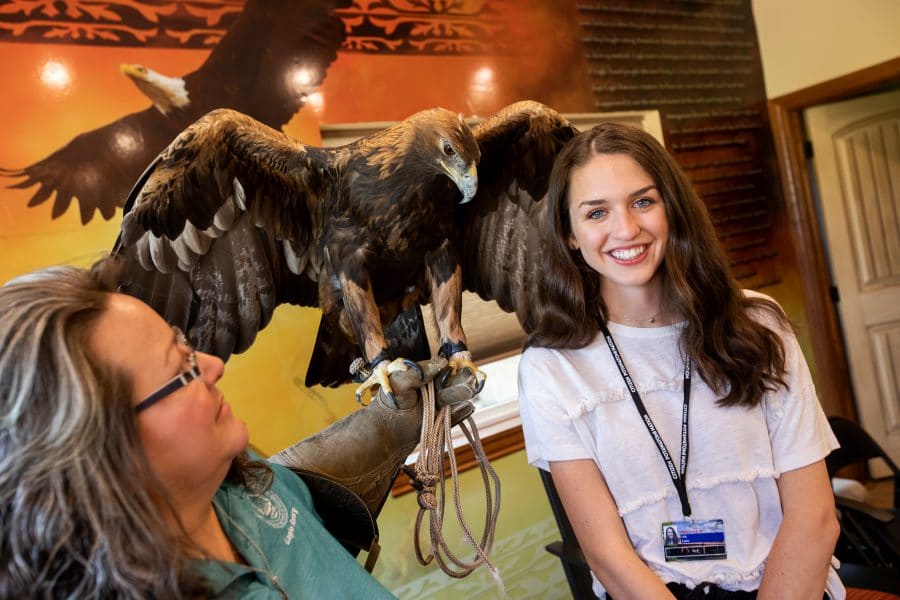Ryan Thompson felt inspired one morning in late spring 2018. While driving to work at Medtronic in Boulder, Colorado, the local NPR radio station covered a story about Colorado State University police that removed two Mohawk teenagers from a campus tour. Another student’s mother had called the authorities, alleging the Mohawk teens were acting suspicious due to their appearance.
“That was the moment that I said, ‘What am I doing today is probably not enough, and is there something I could do within our company?’” Thompson asked.
Thompson serves as Medtronic’s senior director of clinical therapy training and oversees the company’s minimally invasive therapies group in North and South America. He knew Medtronic had internal employee organizations for a variety of backgrounds, but he realized nothing existed for Native Americans.
Looking for solutions, he spoke with co-workers and garnered enough interest to establish the American Indian Employee Resource Group. Its main mission is to foster community and awareness.
“What we are trying to go out and achieve is decreasing the disparity in higher education for high-potential Native American students,” Thompson said.
The organization focuses on ways Medtronic can recruit younger Native students.
“If there’s not a lot of highly-qualified (Native American) candidates to come into a medical device world, then you’re not going to have a lot of American Indians in that space,” he said. “If we can help educate them in the sciences, providing the education that they need to be successful … we can increase that pool of candidates with a targeted approach.”
As a medical device company, Medtronic specializes in creating technological solutions for many conditions like diabetes and heart disease that impact Native Americans at much higher rates than non-Native counterparts. The employee group also seeks to increase awareness of certain diseases that disproportionately impact Native American populations.
Based on these ideals, participants created an annual scholarship program that is open to Native Americans pursuing degrees in science, technology, engineering and math as well as business.
The Medtronic American Indian Employee Resource Group has awarded several scholarships to deserving students, including Citizen Potawatomi Nation tribal member and 2019 Potawatomi Leadership Program participant Lilly Lewis.
Scholarship recipient

Lewis learned about the Medtronic scholarship through the CPN Department of Education. After reading the criteria, she decided to apply. Lewis is a junior studying neuroscience at the University of Texas at Dallas. The health care sector and Medtronic’s impact on her family inspired her desire to become a physician’s assistant. Her father is a cancer survivor, and her younger brother Tate Lewis has hypoplastic left heart syndrome.
“I definitely found a lot — even as a kid — of comfort from the nurses and doctors that would just do so much for the family, and I saw firsthand how big of a difference having someone who knows how to show empathy and care for patients can make,” Lewis said. “So from a young age, I knew that would be something that I wanted to do.”
To apply for the scholarship, Lewis sent in letters of recommendation and wrote an essay on how she related to the company’s mission statement.
“Medtronic is about taking away pain and restoring health and extending life of people who are using their products, so that was a pretty easy one for me because of my little brother,” she explained.
Lewis’ brother has a pacemaker manufactured by Medtronic. She appreciates the company’s dedication to advancement, especially after an experience in California last year.
“His pacemaker wasn’t working properly, and from San Francisco, his doctors at Medical City in Dallas were able to work on his pacemaker in San Francisco from here (in Texas), which I think it’s so incredible that when you have proper technology like that. My parents didn’t have to come home immediately. No one even stressed too much,” Lewis said.
The Medtronic pacemaker also automatically adjusts to Tate’s needs, which provides the Lewis family peace of mind.
“I know it means so much to my mom that she’s not having to constantly make sure his lips aren’t turning blue like she did before he got the pacemaker,” she said.
Connections
Although the COVID-19 pandemic has required Medtronic employees to put in even more time and effort as one of the leading ventilator manufactures worldwide, the company’s American Indian Employee Resource Group participants remained dedicated to their mission.
“We had to execute on the scholarship,” Thompson said. “We committed to these individuals, and we couldn’t back out on that. We can’t say, ‘Hey, because of COVID-19, we can’t pay you,’ or ‘We don’t have the bandwidth for this.’”
The moment Thompson called Lewis to inform her she received the scholarship had special significance. The employee group met its first long-term goal despite the pandemic, and the news relieved some of Lewis’ stress so she could focus on finishing the spring 2020 semester strong.
“I just felt like a weight was lifted off my shoulders immediately for financing the rest of undergrad,” she said.
While on the phone, Thompson and Lewis also learned they are related through Potawatomi Chief Abram Burnett.
“Not sure where in the family tree she is, but it’s pretty cool that a connection had been made,” Thompson said.
2021 application
To inform Native American students nationwide of the 2021 scholarship opportunity, Medtronic established a partnership with the American Indian Science and Engineering Society. Find the 2021 Medtronic scholarship qualifications and application on the AISES website at aises.org.
